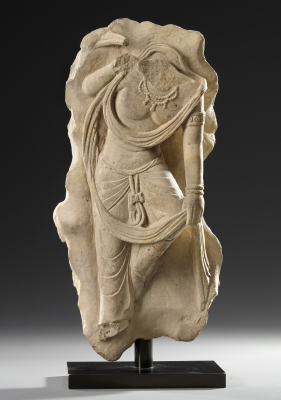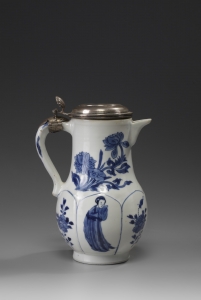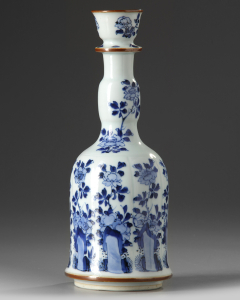A CHINESE SANDSTONE FIGURE OF A STANDING BODHISATTVA, TANG DYNASTY (618-906 AD)
A Chinese figure of bodhisattva, standing with the slender left arm suspended by the side grasping a sash in the fleshy hand, the right arm tucked close to the body and bent at the elbow, the exposed torso with a rounded belly and the hips tilted forward above straight legs, the body adorned with a necklace at the chest, and an armband and bracelet, a long sash draped across the shoulders and sweeping in ribbon-like folds across the arms and body. This magnificent sculpture embodies many of the finest qualities of Tang dynasty art. The sensitive modeling of the torso, with a gently swelling stomach and breast, and the elegant pose, which convincingly suggests a sense of ethereal ease, are superb. The ‘spiritual naturalism’ characteristic of the period is evident in the graceful folds of the skirt and scarf that clings to the body, and the attention paid in the depiction of the fleshy hands. The figure depicts a heavenly being, but imbued with human qualities. The right arm and hand disproportionate in relation to the rest of the body when seen from the front suggest that the figure was originally placed next to a sculpture of a Buddha on a platform or wall niche, and was made to be seen sideways. In its rendering the sculpture exhibits the deep influence of Indian Gupta sensuality on Tang art. The sensual modelling and slightly stern character of these figures, which combined Hellenistic traits with north and north-western Indian styles, took a softer tone in China. This is evident in the gentle roundness of the stomach with the navel exposed, and subtle tilting of the hip that endows the figure with a stately appearance. Height 50 cm.
Global shipping available









